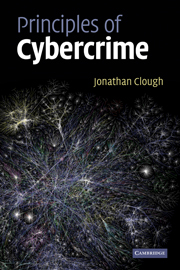Book contents
- Frontmatter
- Contents
- Preface
- Acknowledgements
- List of abbreviations
- Table of cases
- Table of legislation
- PART I Introduction
- PART II Computer as target
- 2 Computer as target
- 3 Access offences
- 4 Impairment of data
- 5 Misuse of devices
- 6 Interception of data
- PART III Fraud and related offences
- PART IV Content-related offences
- PART V Offences against the person
- PART VI Jurisdiction
- Bibliography
- Index
5 - Misuse of devices
Published online by Cambridge University Press: 05 June 2012
- Frontmatter
- Contents
- Preface
- Acknowledgements
- List of abbreviations
- Table of cases
- Table of legislation
- PART I Introduction
- PART II Computer as target
- 2 Computer as target
- 3 Access offences
- 4 Impairment of data
- 5 Misuse of devices
- 6 Interception of data
- PART III Fraud and related offences
- PART IV Content-related offences
- PART V Offences against the person
- PART VI Jurisdiction
- Bibliography
- Index
Summary
Introduction
The offences discussed in previous chapters may require a level of technical sophistication to commit. Certainly, gaining unauthorised access to computer systems, or writing malicious code, often requires a level of expertise not possessed by most people. At the other end of the spectrum, all that is required in some cases is access to the relevant password. In either case, the need for a means of access creates an incentive to acquire items which facilitate that process, and may create a black market in passwords and other information that may facilitate computer misuse. For example, a person may make available on the Internet information outlining security weaknesses in a computer system. Another may post malicious code. Yet another may simply trade in passwords. ‘Rootkits’, which disguise a person's presence on a compromised computer, were once the domain of highly skilled hackers. Now, they are freely and widely available and increasingly easy to use.
While such conduct may be prosecuted under existing offences such as conspiracy to defraud or incitement, there is an arguable need for offences which specifically relate to trafficking in items that facilitate the commission of computer offences. The aim of these inchoate offences is to restrict access to specific items that are used to commit the relevant offences.
- Type
- Chapter
- Information
- Principles of Cybercrime , pp. 120 - 134Publisher: Cambridge University PressPrint publication year: 2010



